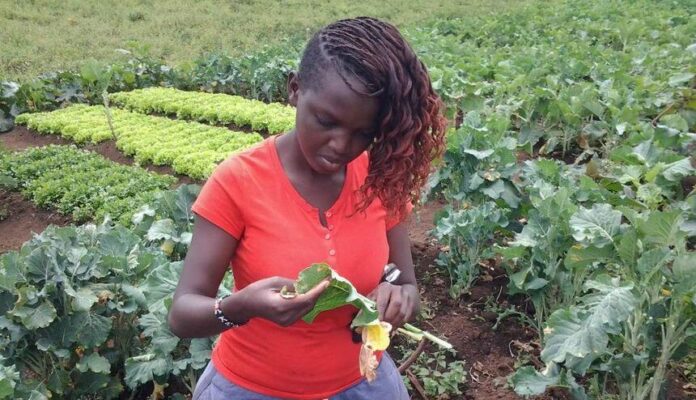Mixed Farming Kenya: Phylis Wangari Kanja decided to quit a top marketing job in a bank at age 25 o start an agribusiness venture. She started Elim Gardens Spring Farm, where she engages in horticulture and dairy farming.
“When I decided to relocate from Nairobi last year, some of my family members and friends thought I was crazy. They told me that I was not going to last one month in the village but it’s been six months and I am not looking back,” Wangari says.
She did her degree in public relations in 2010 at Inoorero University. She then started doing small businesses in Nairobi and her last job was as a marketer in a bank.
An opportunity to get into farming came when her parents decided to dump maize farming.
“I was employed and my parents work in Nairobi and there was nobody living here so maize was a convenient crop to grow. I have always had a passion for farming so last year after the harvest of maize in August, my parents decided to venture into horticulture. That is when I decided to move to Njoro and make farming my full time job,” she says.
Jacque Maribe: How Monica Kimani’s murder charges changed my life
Wangari is quick to add that before you venture into farming, information is key and one must do a lot of research. “I wanted to grow watermelon but after doing my research, I learnt that this weather is not suitable for watermelon. It’s important to understand the weather, type of soil and what crops can and cannot do well in the area you intend to farm,” Wangari advises, adding that she settled for tomatoes, vegetables and dairy farming.
Wangari has planted tomatoes, kales, cabbages, spinach and green peas in her farm.
She got about Sh.150,000 from the first harvest of tomatoes from one and half acres of land.
Tomatoes are currently selling at Sh.75 per kilo but Wangari sells using crates, at a cost of between Sh.1,600 and Sh.1,800.
She adds that black spots and pests are some of the challenges she encounters in her project, but through the use of pesticides, she has been able to realise decent profits. “We also have kales on two and half acres. Currently the demand for kales is low as most people have planted them in their farms due to the ongoing rains,” she says.
The market price for a bag of kales has gone as low as Sh500 from between Sh1,200 and Sh1,800.
Her main market is Egerton University, which buys about four bags of kales in a day at Sh.800 each. She gets about Sh.22,400 every week from the university. She also sells to individuals every Thursday. “However, the university market is tricky because it’s only there when the students are in school,” she says.
Wangari has also planted carrots, capsicum and cucumber. In addition, she has some lettuce, coriander and green pepper in the nursery. The farm also has fruit trees like tree tomatoes and avocados.
Wangari is currently harvesting green peas. So far, she has sold 15 (90kg) bags, with a kilo fetching Sh35, earning her Sh45,000. She is expecting to do another harvest in a week’s time.
Crop diseases have been a major challenge but she says having a farm manager who is knowledgeable on horticulture is a plus. Besides the farm manager, she also employs six women on a casual basis and pays them Sh200 per day each.
When she was starting the dairy farming project, she consulted an officer from the department of agriculture in Njoro on how to construct a proper dairy shed.
Sh. 14 million monthly rent Lonrho building still on sale at Sh. 1.9 billion
“I started with constructing a zero grazing unit from my savings and also bought a one year and ten months old pedigree Friesian heifer at Sh75,000. I have since added two more heifers which I bought at Sh40,000 and Sh60,000 respectively,” says Wangari.
However, she is yet to get back her returns as two of the cows have just calved, one is being milked and produces 15 litres a day.
She has also dug a borehole at Sh2 million where she gets water for irrigation. She also supplies water to the neighbouring community. “We supply water to about 70 households in Njukirie, Belba and Lions areas with each household paying a minimum of between Sh400 and Sh500 per month. We are working to connect people at Michukiria area and our target is to supply 200 households,” Wangari says.
“Farming pays and at the end of it all, you will get back your money if you do it right and have the right information. Bottom line is, you must have a passion and do not venture into farming without information. Do research by visiting farmers, the Kenya Agricultural Research and Livestock Organisation and agriculture shows as the more information you get, the more equipped you will be to handle the challenges,” she concludes. Mixed Farming Kenya.









Am also a farmer growing tomatoes and keeping poultry, it’s nice idea
Very educative and inspiring
I want to join farming